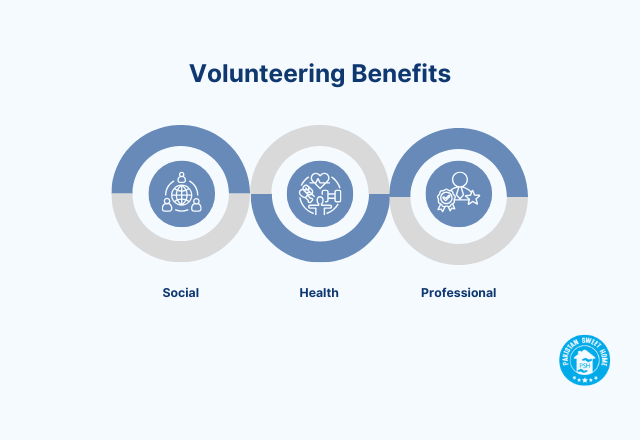
- DONATE
- SPONSOR A CHILD
- Zakat calculator
- SIGN IN
-
- About Us
- FAQ's
- Contact
- Get Involved
- Admissions
- Sign In
- SPONSOR A CHILD ZAKAT CALCULATOR DONATE
-
info@pakistansweethome.org.pk
(051) 4865856
+92 335 1118477

5 min read

Feeling disconnected or stuck in a routine?
Many of us struggle with a lack of meaningful connections, stress, and even feeling like we’re just going through the motions in life. The same old cycle can leave us feeling drained, unfulfilled, and disconnected from both ourselves and others.
But there's a simple, impactful way to break free: volunteering. It’s not just about giving back; it's about gaining more—better health, stronger relationships, and new career opportunities.
Let's explore how volunteering can improve your social life, mental health, physical well-being, and career.
Following are the social benefits of volunteering.
Volunteering strengthens community ties by connecting individuals to shared goals and causes. During the 2023 'Food Drive for All,' thousands of U.S. volunteers worked together. They formed lasting bonds while distributing meals to over 10 million people in need.
Such initiatives build connections that strengthen the community while fostering belonging, collaboration, and acts of kindness.
New to a city or expanding your social circle? Volunteering helps you meet like-minded people.
Programs like Habitat for Humanity bring diverse people together. They work side-by-side to build homes for families in need. Such collaborative efforts create strong friendships, enhance social skills, and expand your network in meaningful ways.
Volunteering promotes inclusivity by breaking down barriers and encouraging understanding across different cultures and backgrounds.
For example, Amnesty International's volunteer programs unite people from diverse ethnicities to advocate for human rights, fostering mutual respect and global awareness. These experiences not only enrich volunteers personally but also contribute to a more accepting and compassionate society.
When individuals come together to volunteer, they create lasting change.
The Great Green Wall Project in Africa mobilized thousands of volunteers to plant trees across the Sahel, combating desertification. These efforts showcase how volunteering can inspire positive change and empower communities.
Volunteering provides a safety net during difficult times.
Disaster relief organizations like Team Rubicon offer aid to affected communities. They also create volunteer support networks. In challenging circumstances, these networks provide emotional and practical support, helping both volunteers and beneficiaries navigate adversity.
Following are the mental health benefits of volunteering.
Volunteering gives you a natural sense of accomplishment. By helping others, you improve your self-esteem and life satisfaction. Knowing you’ve made a difference provides pride and a strong identity. As you feel better about yourself, you develop a more positive outlook on life and your future.
One of the key benefits of volunteering is its ability to reduce the risk of depression. Social isolation contributes to depression, but volunteering engages you with others, building connections and support.
These relationships help protect you against stress and depression, especially during difficult times. Additionally, interacting with pets and animals can help improve mood, alleviating stress and anxiety.
Volunteering offers a fun and easy way to explore your passions. Meaningful volunteer work offers a refreshing break from daily routines like work, school, or family. It provides an opportunity to step away and recharge. It also brings a sense of creativity, motivation, and purpose to your personal and professional life.
Many people volunteer to reconnect with hobbies outside of their regular commitments. Volunteering can offer the perfect escape if you work a desk job but love the outdoors. Consider helping at a community garden, animal shelter, or children's camp.
Studies consistently show that helping others brings joy. Research from the London School of Economics reveals that volunteering has a direct correlation with happiness. In their study, individuals who volunteered regularly reported higher levels of happiness.
Volunteers who participated monthly were 7% more likely to describe themselves as "very happy" than non-volunteers. Volunteers who helped every two to four weeks saw a 12% happiness increase. Weekly volunteers saw a 16% increase in happiness.
This boost in happiness is comparable to having an income of $75,000–$100,000 instead of $20,000. Volunteering, it seems, truly brings joy.
The following are the physical benefits of volunteering:
Volunteering roles, such as delivering meals for programs like Meals on Wheels, often involve walking and carrying items. A study in the Journal of Psychology and Aging found frequent volunteers had lower blood pressure. They also had a reduced risk of heart disease compared to non-volunteers.
Activities like assembling furniture for housing projects (e.g., Habitat for Humanity) involve bending and lifting. Assisting in food banks also requires stretching and lifting.
These motions improve joint mobility and flexibility. Research from the National Institute on Aging shows that staying active reduces age-related mobility issues.
Long-term volunteering in physically demanding roles builds strength and stamina. For example, helping at animal shelters involves walking and handling pets.
For example, a volunteer at an animal shelter might walk dogs for several hours a week, promoting muscle strength and cardiovascular endurance.
Following are the professional benefits of volunteering.
Volunteering allows you to explore industries without long-term commitments while gaining practical insights.
For example, volunteering in a hospital provides exposure to healthcare settings, which can be pivotal for aspiring medical professionals.
According to LinkedIn, 41% of hiring managers consider volunteer work just as valuable as paid work experience. This makes volunteering a practical way to bolster your resume and gain real-world expertise.
For instance, a report by Deloitte found that 82% of hiring managers are more likely to choose candidates with volunteer experience. It’s a powerful way to demonstrate initiative, adaptability, and a commitment to community impact, which employers highly value.
Volunteering roles often offer on-the-job training that sharpens essential skills.
For example, organizing events can improve project management abilities, while serving as a mentor hones leadership and communication skills.
Research by the Corporation for National and Community Service shows that volunteering builds key skills. These include teamwork, public speaking, and problem-solving, enhancing workplace confidence and effectiveness.
One of the most understated benefits of volunteering is the opportunity to connect with professionals in your field of interest. Collaborating with organizations introduces you to like-minded individuals, mentors, and industry leaders who can guide your career.
Volunteering at a tech-focused NGO could lead to internships or job referrals. This gives you a competitive edge in the job market.
In conclusion, volunteering offers a powerful way to enhance your social connections, mental and physical health, and career growth. By giving your time and skills to a cause, you make a difference in others' lives. You also experience personal fulfillment and professional growth.
So, why wait?
Start volunteering today and unlock the numerous benefits that await you.

WRITTEN BY
Dr. Ayesha Khan (Community Development)
Dr. Ayesha Khan is a dedicated social worker with over 15 years of experience in child welfare and community development. As a passionate advocate for vulnerable children, she has worked tirelessly to create safe and nurturing environments for orphans and underprivileged youth. Dr. Khan holds a PhD in Social Work and has specialized in developing sustainable programs that support the holistic development of children. Through her work at Pakistan Sweet Home, she aims to raise awareness and inspire action through her insightful and compassionate writing.
Dr. Ayesha Khan is a dedicated social worker with over 15 years of experience in child welfare and community development. As a passionate advocate for vulnerable children, she has worked tirelessly to create safe and nurturing environments for orphans and underprivileged youth. Dr. Khan holds a PhD in Social Work and has specialized in developing sustainable programs that support the holistic development of children. Through her work at Pakistan Sweet Home, she aims to raise awareness and inspire action through her insightful and compassionate writing.